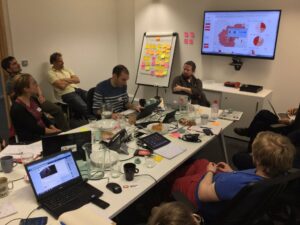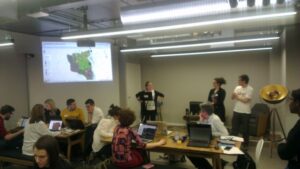Last week, Carolin Klonner, Benjamin Herfort, Melanie Eckle (GIScience Heidelberg and disastermappers heidelberg), Svend-Jonas Schelhorn, Christof Nichterlein (disastermappers heidelberg), Prof. Dr. João Porto de Albuquerque (GIScience Heidelberg and Centre for Interdisciplinary Methodologies, University of Warwick) and Roberto Rocha (University of Münster) travelled to London to meet the Missing Maps team.
During a one and a half day intensive creative workshop with the Missing Maps team, members of Médecines Sans Frontiéres UK and the British Red Cross insights of the work of each partner were given. A brainstorming session facilitated the identification of core tasks and possible contributions of the workshop participants.


On the following day, the team was invited to the British Red Cross to learn more about the practices and projects of the BRC and how their work is supported by the Missing Maps project. The discussions showed that geodata quality is crucial when estimating population distribution or planning vaccination campaigns. The knowledge and work of the GIScience research group on crowdsourcing and VGI in general and OpenStreetMap data quality in particular can be very valuable in this context. The meetings were complemented with the monthly Missing Maps mapathon – one of the large scale mapathons organized by Missing Maps in varying venues all over London with about 80 participants.

We learned how to handle mapathons with a large number of participants and gathered new ideas for own mapathons in Heidelberg. Moreover, the event provided a chance to present our work and research to the wider Missing Maps community and the present members of the Humanitarian OpenStreetMap team.
To further support the Missing Maps project we are open minded to support related bachelor or master theses. Furthermore, there will be several courses at the GIScience department in the coming semester dealing with topics also linked to the Missing Maps project.
Latest research concerning Missing Maps and humanitarian mapping from the GIScience research group include:
Anhorn, J., Herfort, B., de Albuquerque, J. P., (2016): Crowdsourced Validation and Updating of Dynamic OSM Features: A Nepal Earthquake Case Study. 13th International Conference on Information Systems for Crisis Response and Management. ISCRAM 2016. Rio de Janeiro, Brazil.
Herfort, B., Eckle, M., de Albuquerque, J. P., (2016): Being specific about geographic information crowdsourcing: a typology and analysis of the Missing Maps project in South Kivu. 13th International Conference on Information Systems for Crisis Response and Management. ISCRAM 2016. Rio de Janeiro, Brazil.


